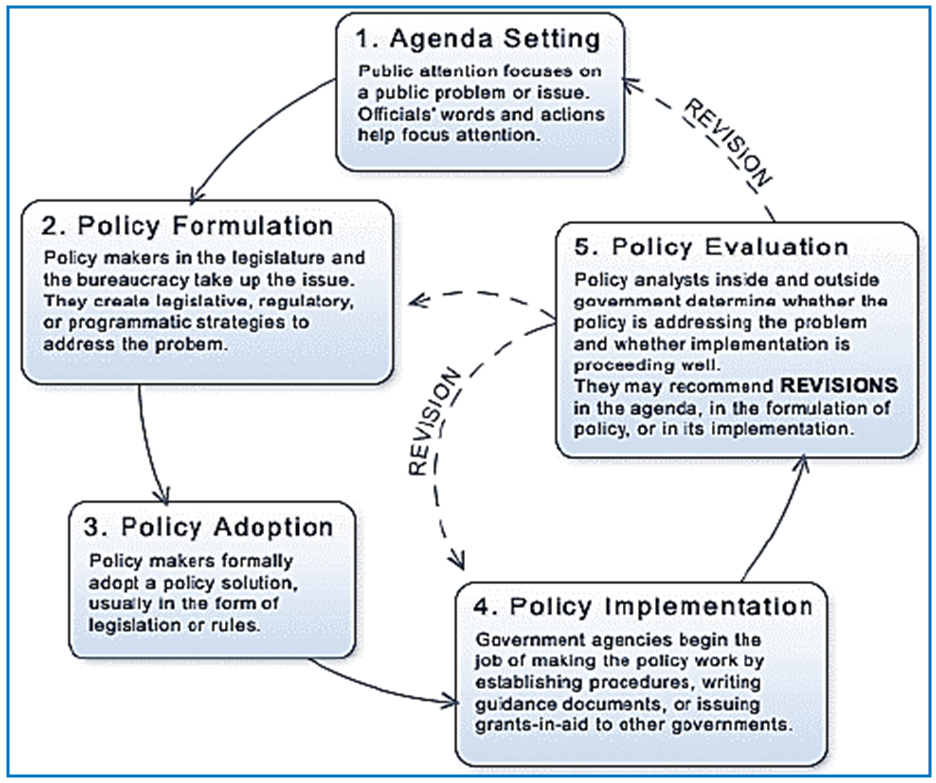-
Paper Information
- Paper Submission
-
Journal Information
- About This Journal
- Editorial Board
- Current Issue
- Archive
- Author Guidelines
- Contact Us
Science and Technology
p-ISSN: 2163-2669 e-ISSN: 2163-2677
2017; 7(3): 72-78
doi:10.5923/j.scit.20170703.02

Policies and Legislation for Internet Access and Usage in Zambia
Nchimunya Hanyama, Dani Banda
Department of Electrical and Electronics, School of Engineering, University of Zambia, Lusaka, Zambia
Correspondence to: Nchimunya Hanyama, Department of Electrical and Electronics, School of Engineering, University of Zambia, Lusaka, Zambia.
| Email: |  |
Copyright © 2017 Scientific & Academic Publishing. All Rights Reserved.
This work is licensed under the Creative Commons Attribution International License (CC BY).
http://creativecommons.org/licenses/by/4.0/

Zambia has a number of Information and Communication Technology (ICT) policies and legislation in place which addresses internet usage and access such as the Zambia National ICT policy and the ICT Act of 2009 and the Electronic Communication and Transaction Act of 2009. The aim of the study was to ascertain whether the current policies and legislation are applicable in addressing internet access and usage in Zambia. The objectives of the study was to investigate policies and legislations implemented for internet access and usage, investigate the roles of ICTs regulatory agencies and identify stakeholders in implementation of internet access and usage. Using literature review and structured questionnaires which were administered to the key stakeholders such as Zambia Information and Communications Technology Authority (ZICTA), Ministry of Transport and Communication (MoTC), Mobile Network Operators (MNOs) and Internet Service Providers (ISPs). The research revealed that the Regulator and other stakeholder acknowledged that Zambia has policies for implementation of internet usage and access, furthermore, the results showed some laps in the way the stakeholders understood the role of the regulator and its capacity to regulate the MNOs and ISPs. The research concluded that, the stakeholders are aware of the current ICT policies and legislation for internet usage and access. However some of the notable challenges is that of lack of coordination and communication between the stakeholders and the regulators, this was evident in the varying responses that were given by among the regulators, ISPs and MNOs. However, there is need to operationalize ICT policies which can lead to the transformation of the technology of the various sectors.
Keywords: Mobile Network Operators, Internet Service Providers, Policies, Legislation, Regulators, Internet Access, Government
Cite this paper: Nchimunya Hanyama, Dani Banda, Policies and Legislation for Internet Access and Usage in Zambia, Science and Technology, Vol. 7 No. 3, 2017, pp. 72-78. doi: 10.5923/j.scit.20170703.02.
Article Outline
1. Introduction
- Policy can be seen as a long series of more or less related choices, including decision not to act, made by governmental bodies and officials. These are rules and laws made by the government [1]. Legislations can be further broken into a variety of pieces of legislation at national, local, and international levels, including the Constitution, national laws, national administrative regulations and departmental rules, and local regulations [2].The importance of introducing and promoting Information and Communication Technologies (ICT) cannot be over emphasized this is evident in the development of, Zambia ICT policy, which was launched March 2007. It is important to note here that the goal of the ICT policy is to integrate ICT in most of the institutions of the sectors of the Zambian economy and develop the nation’s research or development capacities to support facilitate and contribute to the development of all especially key sectors of the economy including of the appropriate local ICT product and services. Zambia has a number of people who have access to internet and have some knowledge on general use of internet Services. However, the question still remains how many people have knowledge on the ICT polices as well as the content. One might want to believe that Ignorance and lack of interest in reading as a contributing factor to the poor knowledge levels on the available laws and policies pertaining to the Internet usage and accessibility both in rural and urban areas of Zambia.Zambia which is among many developing countries in Africa, equally has developed a number of ICT policies, some of the key legislation on information policy currently in existence in Zambia are the:1. Zambia National ICT Policy that aims to use ICTs in contributing to the national objectives of providing an innovative and productive education and training systems accessible to all citizens for creation of a knowledge based Zambian society2. Information & Communications Technologies Act of 2009 that provides for the economic and technical regulation of ICTs and access rights3. Postal Services Act of 2009 for the regulation of Zambian postal and courier services4. Electronic Communications and Transactions Act of 2009 for the development and operation of a safe, secure and effective environment for electronic transactions5. Independent Broadcasting Authority Act of 2007 that established the Independent Broadcasting Authority to regulate the broadcasting sector6. Computer Misuse and Crimes Act of 2004 that prohibits any unauthorized access, uses or interferences with computer based systemsZambia has ICT policies, policy implementation plans and supporting regulatory instruments in place, although, in some instances, the policies still need finalization and approval. Lack of coordination and insufficient communication are one of the main issues. While the Vision 2030, the Fifth National Development Plan 2004, and the National ICT Policy 2007, all provide for the necessary policy guidance on provision of ICTs and establishment of an information society and economy, what seems lacking is a productive inter-ministerial and inter-agency dialogue to facilitate development of inter-sectorial policies and strategies to guide policy implementation by different ministries, government agencies and civil society.
1.1. Problem Statement
- Poor productive inter-ministerial and inter-agency dialogue to facilitate development of inter-sectoral policies Poor coordination strategies to guide policy implementation by different ministries, government agencies and civil society. In some instances finalization and approval of some of these policies has been seen to be an issue. There is lack ownership of different spaces in the policy and regulation process which is often contested between ministries and regulators.
1.2. Aim
- The research was aimed at investigating the current policies and legislation which address internet usage and access in Zambia.
1.3. Objectives
- 1. Investigate policies and legislations on internet usage.2. Investigate the roles of regulatory agency in internet Usage. 3. Determine implementation of internet policies and Legislation.
1.4. Research Questions
- 1. Analyse policy and legislations for implementing internet access and usage 2. Investigate the role of regulatory agencies in the implementation of policy and legislations in regarding internet access and usage 3. Analyse policy and legislation relating to internet access in Zambia. 4. Identify key stakeholders in the implementation of internet policy and legislation. 5. Determine the effectiveness of internet access policy and legislation in Zambia.
1.5. Significance of the Research
- The findings of this study will help to generate information on the available policies and legislation on internet usage and accessibility in Zambia. The research findings will further provide recommendations on the review of current ICT policies. The results will assist regulatory bodies and other stakeholders to ensure that efforts in addressing the need for regulation for internet usage is adhered to. The research will benefit Ministry of Information communication Technology, ZICTA, MNOs and ISPs, in identifying the gaps within the current policies and ensuring that there is an implementation of provision of internet services in Zambia.
1.6. Limitations
- 1. Some institutions didn’t respond to the letter of request for data collection which reduced the sample size. 2. Some respondents left some of the questions in the questionnaire unanswered.3. Time constraints due to the fact that I had to manage work, family and school. 4. The research targeted 50 respondents but was only able to get back 38 respondents.5. The time taken by the respondents to respond to the questionnaires took longer than expected.
2. Literature Review
- The seclusion or rural communities and the underserved area from ICT resources perpetuates the problems associated with socio-economic deprivation including poverty, most rural communities lack basic ICT services and risk being left out of the information society”. It is further started that the “the legal framework on rural connectivity in Zambia was governed by the Telecommunications Act of 1994 which mandates the Authority to ensure the extension of telecommunications services nation-wide further the National ICT policy of 2006 provides direction regarding rural connectivity, the provision and access to telecommunication/ICT services. [3]Disclosure is greater when policies are tangible and explicit. Such as a paper copy of a firm’s internet policy resonates tangibility, and draws greater attention to the information”. This is also true for most policies which are both simplified and distributed to the relevant population for information purposes. [4]Policies that address technology can be defined as decisions taken by governments for the purpose of affecting rate and direction of technological development and practices of governments. [5]The author further defines, technology policy as development and directing scientific and technological activities in such way which will take requirements of any country in economic, social, political and military fields and their future targets into account”. [6]ICT policy generally covers three main areas: telecommunications (especially telephone communications), broadcasting (radio and TV) and the internet. It may be national, regional or international. Each level may have its own decision-making bodies, sometimes making different and even contradictory policies. Although policies are formally put in place by governments, different stakeholders and in particular the private sector make inputs into the policy process and affect its out- comes. Thus, for example, in the International Telecommunications Union, an intergovernmental body for governments to coordinate rules and regulations in the field of telecommunications, the influence of multinationals has grown enormously. Privatisation of state owned companies has meant that governments can rarely control telecommunications directly”. Zambia has also seen a number of companies being private and the ICT industry has not been left out, Zamtel was one of the companies that was privatized [2]. ICT policy covers information and communications technologies, networks, services, markets and the relationships between the different actors involved in these. It may be national or international in scope. ICTs draw together areas of technology, business and policy that have previously been distinct, policy towards different ICTs is often based around different traditions and assumptions. This is particularly so when it comes to regulation. The ethos of broadcasting regulation, which is based around content and ownership, is very different from that of telecommunications regulation, which is based around technology and interconnectivity”. As Zambia advances in the area of technology there is a need to also review the current ICT policies to incorporate the new strategies being employed by other countries. [7] ISPs complain that the inflexible regulatory regime is a major challenge to their expansion. The time taken for new technologies to be approved has drastically slowed down the implementation of innovative services. The fact remains that there has been no high-level, identified champion for ICT in the Zambian government nor even the private sector. An enabling national climate for ICT investment and adoption is crucial but it requires closer cooperation between different government ministries and between government and the private sector, including effecting transparent public–private partnerships. [8] There are a number of key barriers to internet access in the developing world and a number of factors that make it difficult for people to obtain access to the Internet. These include things such as poverty; high device, data, and telecommunications charges; infrastructure barriers; digital literacy challenges; and operational barriers. Policy has not been left out among the challenges been faced. Many countries in the developing world have policy and operational barriers that constrain Internet usage. This includes things such as monopoly telecommunications providers, tech sector taxes”. Zambia has not been left out in the issue of monopoly of telecommunications and internet usage even though it has a number of ISPs in operation Zambia’s Zamtel still has the lead. [9] Effective regulatory institutions require adequate expertise and resources, which developing countries may find difficult to support. To address such barriers, capacity building in the regulatory field is a line of activity in most developmental programmes, including training and exchange programmes with developed nation regulatory institutions. However, such formal institutions can also be supported by non-public sector entities, both commerce and civil society, which can operate in a regulatory capacity, whether directly or indirectly. Self or co-regulation, for example, looks to industry to establish, monitor and enforce rules over its members. While we traditionally conceive of regulation in terms of laws and rules, we must also be aware of other processes occurring at a national and international level that effectively regulate the way a society embraces the manifestations of the Information Economy. [10]
2.1. Conceptual/ Theoretical Framework
2.1.1. Comprehensive Rationality Theory
- The research adopted Comprehensive Rationality Theory which states that, policy decisions are mostly made on the basis of specific and known policy goals. However, once the goals are known or have been determined, the policy decision making process involves conducting a comprehensive and rational analysis of all alternative approaches and consequences to attaining the goals. Hebert Simon a leading proponent on the rationalist theories, argued that a rational policy decision maker should choose the alternative likely to achieve the optimum desired policy outcome. It is important to note here that there are a number of issues generated by this approach to policy decision making and these include: 1. How are realistic goals to be determined in the first place?2. How are these realistic goals set in a brainstorming situation without the benefit of some prior immersion into the issues and options?3. Is all the information relevant in the policy making decision readily available4. How comprehensive can the analysis be especially in a rapidly changing environment like that obtaining in the ICTs sector; where there are ever rapid changes in the environment?5. What is the scope in this model for alteration of the course of the policy making once the comprehensive analysis has been conducted and a specific path is embarked.
2.1.2. Conceptual Framework
3. Methods and Materials
3.1. Research Design
- Descriptive survey which made use of qualitative method. The research used both primary and secondary data.
3.2. Research Location/ Population
- Research was conducted in Lusaka Province as the target population head offices are located in Lusaka. Respondents included- current active operating MNOs and ISPs. The Regulator - Zambia Information and Communications Technology Authority (ZICTA) and Ministry of Transport and Communication.
3.3. Sample Size
- The research had a sample of 50 respondents which was selected through purposive sampling as the target group was specific in nature i.e. ISPs, MNO and Regulators.
3.4. Data Collection and Analysis
- Questionnaires were administered to the respective institution. Data was analysed using the Statistical Package for Social Sciences (SPSS) and Excel, windows 8.The questionnaire used five level Likert scale i.e. 1- Strongly Agree, 2- Agree, 3- Neutral, 4- Disagree, 5- Strongly DisagreeThe results revealed some gaps between the regulators, ISPs and MNOs in that they were variations in understanding as to whether Zambia has specific internet policies, 75% as seen in figure 2 of the respondents responded neutral which indicates they are unclear while the ISPs and MNOs represented by 39% as seen in figure 3 gave an affirmative response and disagreed that Zambia does not have specific Policies that address internet Access.The majority of the respondents represented by 43% agreed that the regulator has the capacity to regulate the ISPs and MNOs while 29% of the respondents disagreed, that the regulator doesn’t have the capacity to regulator the ISPs and MNOs. This however, indicates that there is lack of understanding of the role of regulatory agency. The results revealed that 39% as seen in figure 5 of the ISPs and MNOs disagreed that stakeholders are not in involved in the implementation of the policies while 75% as seen in figure 4 of the regulators agreed that stakeholders are involved in the implementation of internet policies. Therefore, there is need to revisit the levels of involvements by the various stakeholders.
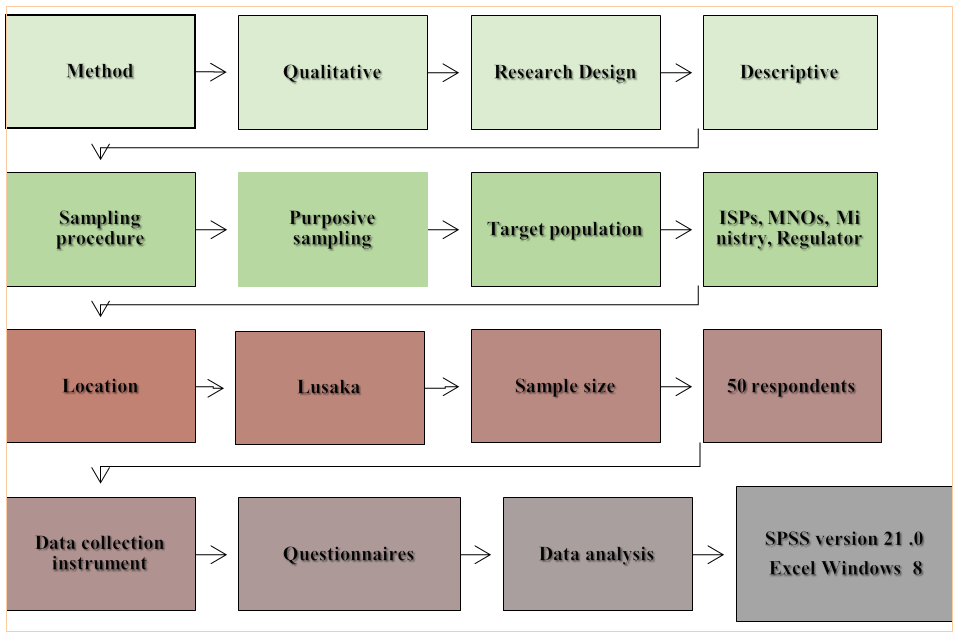 | Figure 1. Methodology |
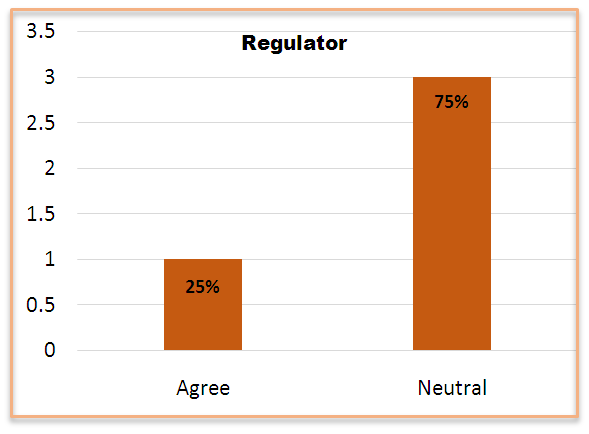 | Figure 2. Addressing internet specific policies (Regulator) |
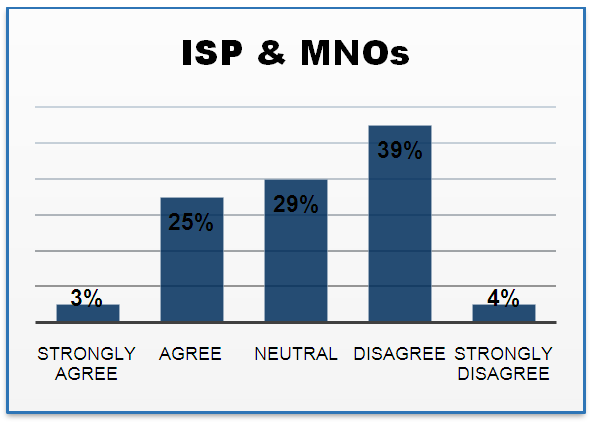 | Figure 3. Addressing internet specific policies (ISPs and MNOs) |
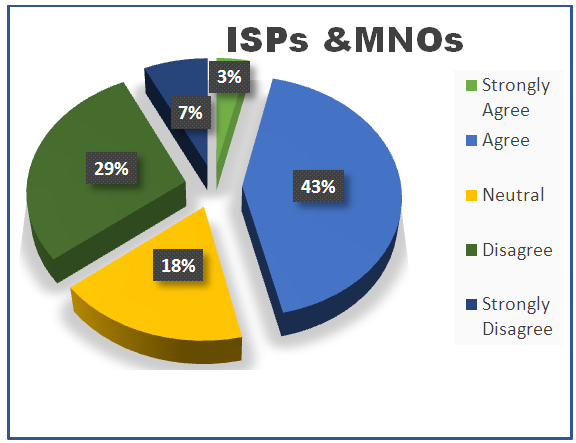 | Figure 4. Capacity to regulate ISPs and MNOs |
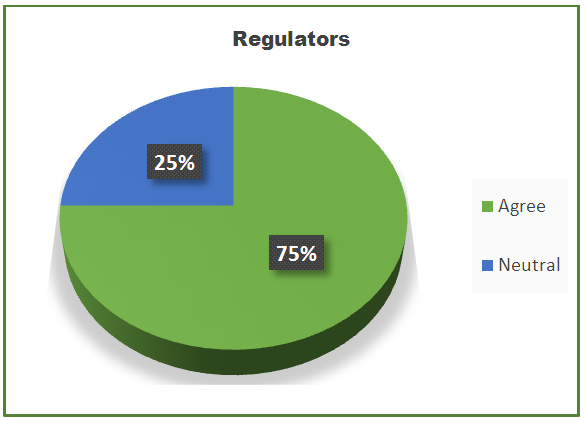 | Figure 5. Stakeholders involvement in implementation |
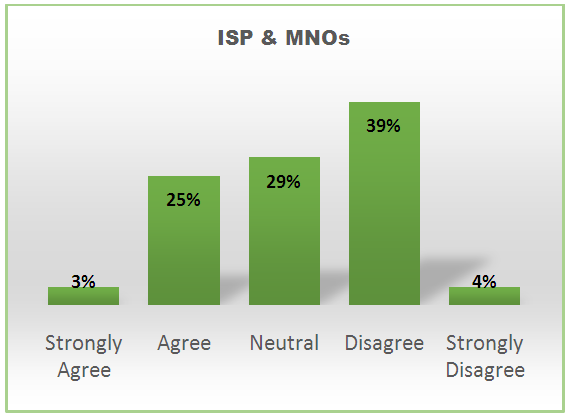 | Figure 6. Stakeholders involvement in implementation |
4. Recommendations
- Ÿ It is evident that the Zambian government has put in place a number of policies address various ICT sectors but it’s however does not have a specific policy addressing internet usage.Ÿ There is need to review current policies, as some date as far back as 1994, the ICT sector is an evolving sector, hence the need to review policies regularly to meet the current changes. Ÿ Regulator involvements, performance checks and consultative sessions with the various stakeholders e.g. ISPs, MNOs, the Ministry and the general public. Ÿ Sensitization and awareness raising on the contents of the various ICT policies e.g. Computer Misuse and Crimes Act of 2004.Ÿ Regular Planning, Monitoring and Evaluation of the current policies to ascertain there usefulness's and effectiveness as well as the level of adherence by the stakeholders.
5. Conclusions
- 1. Zambia has a number of Policies which were developed as far back as 2009 and over the years a number of technological advancements have taken place including the number of people using internet services either for personal use or work related. However, Zambia still doesn’t have a specific internet policy on usage. This is evident with the findings.2. With changing and developing technology ZICTA has a huge task of managing the service providers in that there is need for the regulator to provide checks and balances in order to close up gaps on doubts as to whether ZICTA as the capacity to Regulate the service providers. This was evident in the varying responses indicating that the regulator has some work to do in order to provide the much needed support both to the service provider and the consumer e.g. Awareness raising on the role of the regulator as well as consumer protection and quality of service in relation to internet usage and access. 3. Stakeholder involvement is an essential aspect of service provision and the collaboration between the regulator and the service providers is one of them. However, it was noted that the service providers indicated that they are not involved in the implementation of policies this because the task is given to government ministries that are responsible for ICT policy implementation which is also dependent on the availability of funds. This is evident in the varying responses given by the regulator and the service providers. In summary based on the research objectives, the following emerged as the main issues; 1. Lack of Coordination between the ISPs & MNOs and the regulators. 2. Lack of Collaborations between the sectors, ISPs, MNOs, Regulator and the line Ministries tasked with the responsibility of ICT policy implementation. 3. Unclear information or whether Zambia has specific internet policies. 4. The need for ICT policy awareness.
ACKNOWLEDGEMENTS
- I would like to express my sincere gratitude to my supervisor Dr. Dani Banda from the University of Zambia, School of Engineering, for the effortless guidance throughout the research process despite his busy schedule. Am grateful to Dr. Simon Tembo, Dr. Erastus Mwanaumo and Mr. Shuller Habeenzu from the University of Zambia, School of Engineering as they were also instrumental throughout the process of my Masters, Am also grateful to the Ministry of Transport and Communication, Zambia Information Communication Technology Authority (ZiCTA), ZAMTEL, MTN, Hai Zambia, Liquid Telecoms, Zamnet, I-connect, Microlink and Airtel for allowing me to conduct the research in there institution. Lastly I would like to express my sincere gratitude to my family and friends particularly Ms. Khuta Hara-Hanayama who supported me throughout this process.
 Abstract
Abstract Reference
Reference Full-Text PDF
Full-Text PDF Full-text HTML
Full-text HTML